LG V9 WD 960 User Manual
Displayed below is the user manual for V9 WD 960 by LG which is a product in the Washing Machines category. This manual has pages.
Related Manuals

www.lg.com
Copyright © 2019 LG Electronics Inc. All Rights Reserved
OWNER'S MANUAL
WASHER-
DRYER
Before beginning installation, read these instructions carefully. This will simplify
installation and ensure that the product is installed correctly and safely. Leave
these instructions near the product after installation for future reference.
EN ENGLISH
FWV917WTS V9WD107H2S F4DV910H2
V9WD96H2 V9WD960 F4DV909H2 FWV996WTS
MFL71408054
Rev.01_082619

TABLE OF CONTENTS This manual may contain images or content
different from the model you purchased.
This manual is subject to revision by the
manufacturer.
IMPORTANT SAFETY INSTRUCTIONS ........................................3
READ ALL INSTRUCTIONS BEFORE USE ..................................................... 3
WARNING ......................................................................................................... 3
CARING FOR THE ENVIRONMENT ................................................................ 8
Disposal of Your Old Appliance .........................................................................8
INSTALLATION ...............................................................................9
Parts and Specifications....................................................................................9
Installation Place Requirements...................................................................... 11
Unpacking the Appliance.................................................................................12
Levelling the Appliance ...................................................................................13
Connecting the Water Inlet Hose ....................................................................14
Installing the Drain Hose .................................................................................16
OPERATION .................................................................................17
Operation Overview ........................................................................................17
Preparing the Wash Load ...............................................................................17
Adding Detergents and Softeners ...................................................................18
Control Panel ..................................................................................................21
Programme Table ............................................................................................ 22
Extra Options and Functions ........................................................................... 27
SMART FUNCTIONS ....................................................................31
Using LG SmartThinQ Application ..................................................................31
Using Smart Diagnosis....................................................................................33
MAINTENANCE ............................................................................ 35
Cleaning After Every Wash .............................................................................35
Cleaning the Appliance Periodically ................................................................35
TROUBLESHOOTING .................................................................. 38
Before Calling for Service ...............................................................................38
OPERATING DATA .......................................................................45
Product Fiche ..................................................................................................45

3
EN
IMPORTANT SAFETY INSTRUCTIONS
READ ALL INSTRUCTIONS BEFORE USE
The following safety guidelines are intended to prevent unforeseen risks
or damage from unsafe or incorrect operation of the appliance.
The guidelines are separated into ‘WARNING’ and ‘CAUTION’ as
described below.
Safety Messages
This symbol is displayed to indicate matters and operations
that can cause risk. Read the part with this symbol carefully
and follow the instructions in order to avoid risk.
WARNING
This indicates that the failure to follow the instructions can cause
serious injury or death.
CAUTION
This indicates that the failure to follow the instructions can cause the
minor injury or damage to the product.
WARNING
WARNING
To reduce the risk of explosion, fire, death, electric shock,
injury or scalding to persons when using this product, follow
basic precautions, including the following:

4
EN
Technical Safety
•This appliance can be used by children aged from 8 years and above
and persons with reduced physical, sensory or mental capabilities
or lack of experience and knowledge if they have been given
supervision or instruction concerning use of the appliance in a safe
way and understand the hazards involved. Children shall not play
with the appliance. Cleaning and user maintenance shall not be made
by children without supervision.
•Children of less than 3 years should be kept away unless
continuously supervised.
•If the power cord is damaged, it must be replaced by the
manufacturer, its service agent or similarly qualified persons in order
to avoid a hazard.
•Ventilation openings must not be obstructed by a carpet.
•This appliance is intended to be used in household only and not in
applications such as;
−Staff kitchen areas in shops, offices and other working
environments;
−Farm houses;
−By clients in hotels, motels and other residential type
environments;
−Bed and breakfast type environments;
−Areas for communal use in blocks of flats or in launderettes
•Use a new hose or hose-set supplied with the appliance. Reusing old
hoses can cause a water leak and subsequent property damage.
•The water pressure must be between 100 and 1000 kPa.
•The maximum capacity in some cycles for dry clothes to be used:
FWV917WTS V9WD107H2S
F4DV910H2
V9WD96H2 V9WD960
F4DV909H2 FWV996WTS
10.5 kg (Wash) / 7 kg (Dry) 9 kg (Wash) / 6 kg (Dry)

5
EN
Installation
•Never attempt to operate the appliance if it is damaged,
malfunctioning, partially disassembled, or has missing or broken
parts, including a damaged cord or plug.
•This appliance should only be transported by two or more people
holding the appliance securely.
•Do not install the appliance in a damp and dusty place. Do not install
or store the appliance in any outdoor area, or any area that is subject
to weathering conditions such as direct sunlight, wind, or rain or
temperatures below freezing.
•Tighten the drain hose to avoid separation.
•If the power cord is damaged or the hole of the socket outlet is loose,
do not use the power cord and contact an authorized service centre.
•Do not plug multiple socket outlets, an extension power cable or
adapter with this appliance.
•This appliance must not be installed behind a lockable door, a
sliding door or a door with a hinge on the opposite side to that of the
appliance, in such a way that a full opening of the appliance door is
restricted.
•This appliance must be grounded. In the event of malfunction or
breakdown, grounding will reduce the risk of electric shock by
providing a path of least resistance for electric current.
•This appliance is equipped with a power cord having an equipment
grounding conductor and a grounding power plug. The power plug
must be plugged into an appropriate socket outlet that is installed and
grounded in accordance with all local codes and ordinances.
•Improper connection of the equipment-grounding conductor can
result in risk of electric shock. Check with a qualified electrician or
service personnel if you are in doubt as to whether the appliance is
properly grounded.
•Do not modify the power plug provided with the appliance. If it
does not fit the outlet, have a proper outlet installed by a qualified
electrician.

6
EN
Operation
•Do not attempt to separate any panels or disassemble the appliance.
•Do not apply any sharp objects to the control panel in order to
operate the appliance.
•Do not repair or replace any part of the appliance. All repairs
and servicing must be performed by qualified service personnel
unless specifically recommended in this Owner’s Manual. Use only
authorized factory parts.
•Do not put animals, such as pets into the appliance.
•Keep the area underneath and around the appliance free of
combustible materials such as lint, paper, rags, chemicals, etc.
•Do not leave the appliance door open. Children may hang on the
door or crawl inside the appliance, causing damage or injury.
•Use new hose or hose-set supplied with the appliance. Reusing old
hoses can cause a water leak and subsequent property damage.
•Do not put in, wash or dry articles that have been cleaned in, washed
in, soaked in, or spotted with combustible or explosive substances
(such as waxes, wax removers, oil, paint, gasoline, degreasers,
drycleaning solvents, kerosene, petrol, spot removers, turpentine,
vegetable oil, cooking oil, acetone, alcohol, etc.). Improper use can
cause fire or explosion.
•Never reach into the appliance while it is operating. Wait until the
drum has completely stopped.
•In case of flood, disconnect the power plug and contact the LG
Electronics customer information centre.
•Do not push down the door excessively, when the appliance door is
open.
•Do not touch the door during a high temperature programme.
•Do not use flammable gas and combustible substances (benzene,
gasoline, thinner, petroleum, alcohol, etc.) near the appliance.

7
EN
•If the drain hose or inlet hose is frozen during winter, use it only after
thawing.
•Keep all washing detergents, softener and bleach away from children.
•Do not touch the power plug or the appliance controls with wet hands.
•Do not bend the power cable excessively or place a heavy object on
it.
•Do not wash rugs, mats, shoes or pet blankets, or any other items
other than clothes or sheets, in this machine.
•This appliance must only be used for domestic household purposes
and should not be used in mobile applications.
•If there is a gas leakage (isobutane, propane, natural gas, etc.),
do not touch the appliance or power plug and ventilate the area
immediately.
Technical Safety for Using the Dryer
•Do not dry unwashed items in the appliance.
•Items that have been soiled with substances such as cooking oil,
vegetable oil, acetone, alcohol, petroleum, kerosene, spot removers,
turpentine, waxes and wax removers should be washed in hot water
with an extra amount of detergent before being dried in the appliance.
•Never stop the appliance before the end of the drying cycle unless
all items are quickly removed and spread out so that the heat is
dissipated.
•Items such as foam rubber (latex foam), shower caps, waterproof
textiles, rubber backed articles and clothes or pillows fitted with foam
rubber pads should not be dried in the appliance.
•Fabric softeners, or similar products, should be used as specified by
the fabric softener instructions.
•Remove all objects from pockets such as lighters and matches.
•The appliance is not to be used if industrial chemicals have been
used for cleaning.

8
EN
Maintenance
•Securely plug the power plug in the socket outlet after completely
removing any moisture and dust.
•Disconnect the appliance from the power supply before cleaning the
appliance. Setting the controls to the OFF or stand by position does
not disconnect this appliance from the power supply.
•Do not spray water inside or outside the appliance to clean it.
•Never unplug the appliance by pulling on the power cable. Always
grip the power plug firmly and pull straight out from the socket outlet.
Disposal
•Before discarding an old appliance, unplug it. Cut off the cable
directly behind the appliance to prevent misuse.
•Dispose of all packaging materials (such as plastic bags and
styrofoam) away from children. The packaging materials can cause
suffocation.
•Remove the door before disposing of or discarding this appliance to
avoid the danger of children or small animals getting trapped inside.
CARING FOR THE ENVIRONMENT
Disposal of Your Old Appliance
•This crossed-out wheeled bin symbol indicates that waste electrical and electronic
products (WEEE) should be disposed of separately from the municipal waste
stream.
•Old electrical products can contain hazardous substances so correct disposal
of your old appliance will help prevent potential negative consequences for the
environment and human health. Your old appliance may contain reusable parts that
could be used to repair other products, and other valuable materials that can be
recycled to conserve limited resources.
•You can take your appliance either to the shop where you purchased the product,
or contact your local government waste office for details of your nearest authorised
WEEE collection point. For the most up to date information for your country, please
see www.lg.com/global/recycling.

9
EN
INSTALLATION
Front View
a Control Panel
b Detergent dispenser drawer
c Drum
d Door
e Cover cap
f Drain pump filter
g Drain plug
h Adjustable feet
Rear View
a Power plug
b Transit bolts
c Drain hose
Parts and Specifications
NOTE
•Appearance and specifications may change without notice to improve the quality of the appliance.

10
EN
Accessories
* This feature is only available on some models.
a Cold water inlet hose*
b Spanner
c Caps for covering transit bolt holes*
d Anti-slip sheets*
e Elbow bracket for securing drain hose*
f Tie strap*
Specifications
Model FWV917WTS
V9WD107H2S
F4DV910H2
V9WD96H2
V9WD960
F4DV909H2
FWV996WTS
Wash Capacity 10.5 kg (Wash) /
7 kg(Dry)
9 kg (Wash) /
6kg(Dry)
Power Supply 220 - 240 V~, 50 Hz
Dimension (Width x Depth x
Height) 600 mm X 560 mm X 850 mm
Product Weight 73 kg
•No further backflow protection required for connection to the water inlet.

11
EN
Installation Place
Requirements
Before installing the appliance, check the following
information to make sure that the appliance should
be installed in a correct place.
Installation Location
•Install the appliance on a flat hard floor.
(Allowable slope under the appliance: 1°)
•Never try to correct any unevenness in the
floor with pieces of wood, cardboard or similar
materials under the appliance.
•If it is impossible to avoid positioning the
appliance next to a gas cooker or coal burning
stove, an insulation (850 X 600 mm) covered
with aluminium foil on the side facing the cooker
or stove must be inserted between the two
appliances.
•Ensure that when the appliance is installed, it is
easily accessible for an engineer in the event of
a breakdown.
•With the appliance installed, adjust all four feet
using the transit bolt spanner provided to ensure
the appliance is stable, and a clearance of
approximately 5 mm is left between the top of
the appliance and the underside of any worktop.
•Additional clearance should have 100 mm for
the wall and 20 mm for rear, right and left side.
100 mm
20 mm
5 mm
20 mm
WARNING
•This appliance must only be used for domestic
household purposes and should not be used in
mobile applications.
NOTE
•If the appliance is installed on a raised platform,
it must be securely fastened in order to eliminate
the risk of falling off.
Wooden Floors (Suspended
Floors)
When installing the appliance on wooden floors,
use rubber cups to prevent the appliance from
excessive vibration and unbalance.
•To prevent vibration, we recommend you to
place rubber cups a at least 15 mm thick of the
each foot of the appliance, secured to at least
two floor beams with screws.
•If possible, install the appliance in one of the
corners of the room, where the floor is more
stable.
•Fit the rubber cups to reduce vibration.
CAUTION
•This appliance must only be used for domestic
household purposes and should not be used in
mobile applications.
•If the appliance is installed on the unstable
floor (e.g. wooden floor), the warranty does not
cover any damages and cost occured due to the
installation on the unstable floor.
NOTE
•You can purchase rubber cups (Part
No.4620ER4002B) from the LG Electronics
service centre.

12
EN
Ventilation
•Make sure that air circulation around the
appliance should not be impeded by carpets,
rugs, etc.
Ambient Temperature
•Do not install the appliance in rooms where
freezing temperatures may occur. Frozen hoses
may burst under pressure. The reliability of
the electronic control unit may be impaired at
temperatures below freezing point.
•If the appliance is delivered in winter and
temperatures are below freezing, place the
appliance at room temperature for a few hours
before putting it into operation.
Electrical Connection
•Do not use an extension cord or double adapter.
•Always unplug the appliance and turn off the
water inlet after use.
•Connect the appliance to an earthed socket in
accordance with current wiring regulations.
•The appliance must be positioned so that the
plug is easily accessible.
•Power outlet must be at least 1 meter of either
side of the location of the appliance.
WARNING
•Repairs to the appliance must only be carried
out by the qualified personnel. Repairs carried
out by inexperienced persons may cause injury
or serious malfunctioning. Contact your LG
Electronics service centre.
•The power plug must be plugged into an
appropriate socket outlet that is installed and
grounded in accordance with all local codes and
ordinances.
Unpacking the Appliance
Lifting the Appliance Off the Foam
Base
* This feature is only available on some models.
After removing the carton and shipping material, lift
the appliance off the foam base.
•Make sure the tub support a* comes off with
the base and is not stuck to the bottom of the
appliance.
•If you must lay the appliance down to remove
the carton base b, always protect the side of
the appliance and lay it carefully on its side. Do
not lay the appliance on its front or back.
*
Removing the Bolt Assemblies
1 Starting with the bottom two transit bolts a, use
the spanner (included) to fully loosen all transit
bolts by turning them counterclockwise.
2 Remove the bolt assemblies by wiggling them
slightly while pulling them out.

13
EN
3 Install the hole caps.
•Locate the hole caps b included in the
accessory pack or attached on the back.
Levelling the Appliance
Checking the Level
When installing the appliance, the appliance should
be aligned and perfectly level.
•If the appliance is not aligned and level properly,
the appliance may be damaged or may not
operate properly.
Adjusting and Levelling the Feet
When installing the appliance, the appliance should
be aligned and perfectly level. If the appliance is not
aligned and level properly, the appliance may be
damaged or may not operate properly.
1 Turn the adjustable feet as required if the floor
is uneven.
•Do not insert pieces of wood etc. under the
feet.
•Make sure that all four feet should be stable
and resting on the floor.
2 Check if the appliance is perfectly level using a
spirit level a.
3 Secure the adjusting feet with the lock nuts b
by turning counterclockwise against the bottom
of the appliance.
4 Check if all lock nuts at the bottom of the
appliance are secured properly.
NOTE
•Proper placement and levelling of the appliance
will ensure long, regular, and reliable operation.
•The appliance must be horizontal and stand
firmly in position.
•It must not ‘Seesaw’ across corners under the
load.
•Do not let the feet of the appliance get wet.
Failure to do so may cause vibration or noise.
Using Anti-Slip Sheets
This feature is only available on some models.
If you install the appliance on a slippery surface, it
may move because of excessive vibration. Incorrect
levelling may cause malfunction through noise and
vibration. If this occurs, install the anti-slip sheets
under the levelling feet and adjust the level.
1 Clean the floor to attach the anti-slip sheets.
•Use a dry rag to remove and clean foreign
objects and moisture. If moisture remains,
the anti-slip sheets may slip.

14
EN
2 Adjust the level after placing the appliance in
the installation area.
3 Place the adhesive side a of the anti-slip
sheets on the floor.
•The most effective way is to install the anti-
slip sheets under the front feet. If it is difficult
to place the sheets under the front feet of the
appliance, attach them under the rear feet.
4 Put the appliance on the anti-slip sheets.
•Do not attach the adhesive side a of anti-slip
sheets to the feet of the appliance.
NOTE
•Additional anti-slip sheets are available at LG
Electronics service centre.
Connecting the Water Inlet
Hose
Note for Connection
•Water pressure must be between 100 kPa
and 1000 kPa (1.0 - 10.0 kgf/cm²). If the
water pressure is more than 1000 kPa, a
decompression device should be installed.
•Do not overtighten the water inlet hose to all
valves.
•Periodically check the condition of the hose and
replace the hose if necessary.
Checking the Rubber Seal on the
Water Inlet Hose
Two rubber seals a are supplied with the water
inlet hoses. They are used to prevent water leaks.
Make sure that the connection to taps should be
sufficiently tight.
Connecting Hose to Water Tap
Screw - Type Hose to Tap with Thread
Screw the hose connector to the water supply,
which has ¾” threaded union.

15
EN
NOTE
•Before connecting the inlet hose to the water
tap, turn on the water tap to flush out foreign
substances (dirt, sand, sawdust, and etc.) in the
water lines. Let the water drain into a bucket,
and check the water temperature.
Connecting Screw-Type Hose to Tap
Without Thread
1 Loose the four fixing screws.
Fixing screw
Upper
connector
Rubber
seal
2 Remove the guide plate if the tap is too large to
fit the adapter.
Guide plate
3 Push the adapter onto the end of the tap so that
the rubber seal forms a watertight connection.
Tighten the four fixing screws.
4 Push the supply hose vertically upwards so
that the rubber seal within the hose can adhere
completely to the tap and then tighten it by
screwing it to the right.
Plate
Supply
hose
Connecting One Touch Type Hose
to Tap Without Thread
1 Unscrew the adapter ring plate and loose the
four fixing screws.
Ring plate
2 Remove the guide plate if the tap is too large to
fit the adapter.
Guide plate
3 Push the adapter onto the end of the tap so that
the rubber seal forms a watertight connection.
Tighten the four fixing screws and the adapter
ring plate.

16
EN
4 Pull the connector latch plate down, push the
supply hose onto the adapter, and release the
connector latch plate. Make sure the adapter
locks into place.
Latch plate
NOTE
•After connecting the supply hose to the water
tap, turn on the water tap to flush out foreign
substances (dirt, sand, sawdust, and etc.) in the
water lines. Let the water drain into a bucket,
and check the water temperature.
Connecting Hose to the Appliance
Screw the water line to the water supply on the
back of the appliance.
NOTE
•After completing connection, if water leaks from
the hose, repeat the same steps. Use the most
conventional type of tap for the water supply. If
the tap is square or too big, remove the guide
plate before inserting the tap into the adaptor.
• Make sure that the hose should not be kinked
or trapped.
Installing the Drain Hose
For Model with Drain Pump
The drain hose should not be placed higher than
100 cm above the floor. Water in the appliance may
not drain or may drain slowly.
•Securing the drain hose correctly will protect the
floor from damage due to water leakage.
_DN
•If the drain hose is too long, do not force it back
into the appliance. This will cause abnormal
noise.
•When installing the drain hose to a sink, secure
it tightly with string.

17
EN
OPERATION
Operation Overview
Using the Appliance
Before the first wash, select the Cotton wash
programme and add a half amount of the detergent.
Start the appliance without laundry. This will remove
possible residues and water from the drum that may
have been left during manufacturing.
1 Sort laundry and load items.
•Sort laundry by fabric type, soil level, colour
and load size as needed. Open the door and
load items into the appliance.
2 Add detergent or softener.
•Add the proper amount of detergent to the
detergent dispenser drawer. If desired, add
bleach or fabric softener to the appropriate
areas of the dispenser.
3 Turn on the appliance.
•Press the Power button to turn on the
appliance.
4 Choose the desired cycle.
•Press the cycle button repeatedly or turn the
cycle selector knob until the desired cycle is
selected.
•Now select a wash temperature and spin
speed. Pay attention to the care labeling of
your clothes.
5 Begin cycle.
•Press the Start/Pause button to begin the
cycle. The appliance will agitate briefly
without water to measure the weight of the
load. If the Start/Pause button is not pressed
within 15 minutes, the appliance will shut off
and all settings will be lost.
6 End of cycle.
•When the cycle is finished, a melody will
sound. Immediately remove your clothing
from the appliance to reduce wrinkling.
Check around the door seal when removing
the load for small items that may be caught
in the seal.
Preparing the Wash Load
Sort laundry for best washing results, and then
prepare laundry according to the symbols on the
care labels.
Sorting the Wash Load
•For best washing results, sort your clothes
according to the symbol on the care labels
according to the type of fabric and washing
temperature and wash them with adapted spin
speed.
•Soil (Heavy, Normal, Light): Separate clothes
according to amount of soil.
•Colour (White, Lights, Darks): Separate white
fabrics from coloured fabrics. Wash new dark
and colored garments separately at first.
•Lint (Lint producers, Collectors): Wash lint
producers and lint collectors separately.
Checking the Clothes Care Label
Symbols on the care labels
The symbols tell you about the fabric content of
your garment and how it should be washed.
Symbol Wash / Fabric type
•Normal Wash
•Cotton, Mixed Fabrics
•Easy Care
•Synthetic, Mixed Fabrics
•Special Delicate Wash
•Delicates
•Hand Wash Only
•Wool, Silk
•Do not wash

18
EN
NOTE
•The dashes under the symbol give you
information about the type of fabric and the
maximum allowance of mechanical stress.
Checking the Clothes before
Loading
•Combine large and small items in a load. Load
large items first.
•Large items should not be more than half of the
total wash load. Do not wash single items. This
may cause an unbalanced load. Add one or two
similar items.
•Check all pockets to make sure that they are
empty. Items such as nails, hair clips, matches,
pens, coins and keys can damage both your
appliance and clothes.
•Wash delicates (stockings, underwired bras) in
a wash net.
•Close zippers, hooks and strings to make sure
that these items do not snag on other clothes.
•Pre-treat dirt and stains by brushing a small
amount of detergent dissolved water onto stains
to help lift dirt.
•Check the folds of the flexible gasket (gray) and
remove any small articles.
CAUTION
•Check if the laundry gets stuck between the
door and the seal, otherwise the laundry may
get damaged while washing.
•Remove items from the flexible gasket to prevent
clothing and door seal damage.
Adding Detergents and
Softeners
Detergent Dosage
•Detergent should be used according to the
instruction of the detergent manufacturer and
selected according to type, colour, soiling of the
fabric and the washing temperature.
•If too many suds occur, reduce the detergent
amount.
•If too much detergent is used, too many suds
can occur and this will result in poor washing
results.
•If you wish to use liquid detergent, follow
the guidelines provided by the detergent
manufacturer.
•You can pour liquid detergent directly into the
main detergent drawer if you are starting the
wash cycle immediately.
•Do not use liquid detergent if you are using
Delay End function, or if you have selected
Pre Wash option, as the liquid may harden.
•Detergent usage may need to be adjusted for
water temperature, water hardness, size and
soil level of the load. For best results, avoid
oversudsing.
•Refer to the label of the clothes, before choosing
the detergent and water temperature.
•Use only suitable detergents for the respective
type of clothing:
−Liquid detergent is often designed for special
applications, e.g. for coloured fabric, wool,
delicate or dark laundry.
−Powdered detergent is suitable for all types
of fabric.

19
EN
−For better washing results of white and pale
garments, use powdered detergent with
bleach.
−Detergent is flushed from the dispenser at the
beginning of the wash cycle.
NOTE
•Do not let the detergent harden. Doing so may
lead to blockages, poor rinse performance or
odour.
•Full load: According to manufacturer’s
recommendation
•Part load: ¾ of the normal amount
•Minimum load: ½ of full load
Adding Detergent
•Detergent for main wash a only ~ J
•Detergent for pre wash b and main wash a ~
d # J
NOTE
•Use the appropriate amount of detergent. Too
much detergent, bleach or softener may cause
an overflow.
•When selecting Pre Wash, divide the dosage
into ⅓ for pre wash and ⅔ for main wash.
Adding Detergent Tablet
Detergent tablet is also available when washing
laundry.
1 Open the door and put detergent tablets into
the drum.
2 Load the laundry into the drum and close the
door.
NOTE
•Do not put tablets into the drawer.
Adding Fabric Softener
•Do not exceed the maximum fill line. Overfilling
can cause early dispensing of the fabric
softener, which may stain clothes. Close the
dispenser drawer slowly.

20
EN
•Do not leave the fabric softener in the detergent
drawer for more than 2 days (Fabric softener
may harden).
•Softener will automatically be added during the
last rinse cycle.
•Do not open the drawer when water is being
supplied.
•Solvents (e.g. benzene, etc.) must not be used.
NOTE
•Do not pour fabric softener directly onto the
garments, as this may cause stains on your
clothing.
Adding Water Softener
A water softener, such as anti-limescale can be
used to cut down on the use of detergent in areas
with high water hardness level.
•First add detergent, and then the water softener.
Dispense according to the amount specified on
the packaging.

21
EN
Control Panel
Control Panel Features
a Power Button
•Press the Power button to turn on or off the appliance.
b Programme Knob
•Programmes are available according to the laundry type.
•The lamp will light up to indicate the selected programme.
c Start/Pause Button
•This Start/Pause button is used to start the wash cycle or pause the wash cycle.
•If a temporary stop of the wash cycle is needed, press the Start/Pause button.
d Extra Options and Functions
•Extra options and functions are available for better washing performance. Several options and
functions can be customized.
•To use the extra functions, press and hold the corresponding button for 3 seconds. The
corresponding symbol lights up in the display.
•In order to use the Remote Start function, refer to SMART FUNCTIONS.
•This allows you to select an additional programmes and will light when selected.
−\: When the laundry is spun after steaming, this icon is illuminated.
−G : When the number of rinse is added, this icon is illuminated.
−d : When the heavily soiled laundry is washed intensively, this icon is illuminated.
−f : This icon is illuminated when the appliance is connected to WLAN network.
e Wash+Dry( )
•( ) indicates the drying capacity, which varies on the models.
f AI DD

22
EN
•AI DD M provides the desired washing and spinning.
•M is activated when Cotton, Mixed Fabric, Easy Care programmes are selected and operated.
g Display
•The display shows the settings, estimated remaining time, options, and status messages. When the
appliance is turned on, the default settings in the display will illuminate.
−18:88: When a programme is selected, the default time for that programme is displayed. The default
time can be changed according to the selected option.
−H : When this icon is illuminated, the door cannot be opened.
−k : When the laundry is being washed, this icon is illuminated.
−p : When the laundry is spun to remove the water in the laundry, this icon is illuminated.
−% : When the laundry is being dried after completion of washing programme, this icon is
illuminated.
Programme Table
Washing Programme
Programme Cotton Max. Load Rating
Description Provides better performance by combining various drum motions.
Use for coloured fast garments (shirts, nightdresses, pajamas, etc.) and
normally soiled cotton load (underwear).
Proper Temperature 40 °C (Cold to 95 °C)
Max. Spin Speed 1400 rpm
Programme Cotton+ Max. Load Rating
Description Provides optimised washing performance for large amount of laundry
with less energy consumption.
Use for coloured fast garments (shirts, nightdresses, pajamas, etc.) and
normally soiled cotton items (underwear).
Proper Temperature 60 °C (Cold to 60 °C)
Max. Spin Speed 1400 rpm
Programme TurboWash 39 Max. Load 5 kg
Description Finishes the whole cycle within 39 minutes.
Use for various kind of fabrics except special garments (silk/delicate,
sports wear, dark clothes, wool, duvet/ curtains).
The cycle time will differ depending on the water supply conditions, and
the load and type of laundry.
Proper Temperature 40 °C (Cold to 60 °C)
Max. Spin Speed 1400 rpm

23
EN
Programme Mixed Fabric Max. Load 4 kg
Description Enables various fabrics to be washed simultaneously.
Use for various kind of fabrics except special garments (silk/delicate,
sports wear, dark clothes, wool, duvet/curtains).
Proper Temperature 40 °C (Cold to 60 °C)
Max. Spin Speed 1400 rpm
Programme Easy Care Max. Load 4 kg
Description Suitable for casual shirts that do not need ironing after washing.
Use for Polyamide, acrylic, polyester.
Proper Temperature 40 °C (Cold to 60 °C)
Max. Spin Speed 1400 rpm
Programme Allergy Care Max. Load 4 kg
Description Helps to remove allergens such as house mites, pollen and fur.
Use for cotton, underwear, pillow covers, bed sheets, baby wear
Proper Temperature 60 °C
Max. Spin Speed 1400 rpm
Programme Steam Refresh Max. Load 3 pieces of
laundry
Description Helps to remove wrinkles within 20 mins with steam.
Clothes may be wet. You can put dry clothes on after hanging them for
10‒30 mins.
Use for cotton mixed, polyester mixed dress shirts, blouses.
Proper Temperature -
Max. Spin Speed -
Programme Delicates Max. Load 3 kg
Description Suitable for delicate clothes such as under wear, blouse, etc
Proper Temperature 20 °C (Cold to 40 °C)
Max. Spin Speed 800 rpm
Programme Hand/Wool Max. Load 2 kg
Description For hand and machine washable delicate clothes such as washable
wool, lingerie, dresses etc. (Use detergent for machine washable
woolens).Use for Wool, Silk, hand washable clothes, delicate, easily
damaged laundry.
Proper Temperature 30 °C (Cold to 40 °C)
Max. Spin Speed 800 rpm

24
EN
Programme Speed 14 Max. Load 2 kg
Description Provides fast washing time for small loads and lightly soiled clothes.
Proper Temperature 20 °C (20 °C to 40 °C)
Max. Spin Speed 1400 rpm
Programme Dry Only Max. Load Rating (Dry)
Description Uses the automatic programmes to dry most loads.
For most drying, make sure all laundry are similar in material and
thickness.
Proper Temperature -
Max. Spin Speed 1400 rpm
Programme Wash+Dry Max. Load Rating (Dry)
Description Provides a nonstop process of washing and drying in the same cycle.
Use for a small amount of laundry which can be dried.
Proper Temperature 40 °C (Cold to 95 °C)
Max. Spin Speed 1400 rpm
Programme Tub Clean
Description This is a special function to clean inside of your appliance.
Programme Download Cycle Max. Load 1 piece of laundry
Description The Download Cycle programme allows you to download new and
special washing programs to your washing machine with a smartphone.
The default program is on Rinse + Spin.
Proper Temperature -
Max. Spin Speed 1400 rpm
NOTE
•Select the proper wash temperature and spin speed for the desired programmes.
•When washing, always pay attention to the care label of your clothes.
•Actual maximum spin speed may vary depending on the model, programme, and load conditions.

25
EN
Drying Programme
Programme Normal %
Description Reduces the drying time and energy usage during dry cycle for cottons.
Use for cotton or linen fabrics such as cotton towels, T-shirts.
Max. Load Rating
Programme Iron -
Description Suitable for ironing to dry clothes easily in damp condition.
Use for cotton or linen fabrics which is ready to get ironing at the end of
programme.
Max. Load Rating
Programme Low Temp. *
Description Suitable for drying in low temperature for less clothes damage.
Use for easy care textiles, synthetic fabrics.
Max. Load 3.5 kg
Programme Normal Eco (
Description Suitable for energy dry programme.
Use for cotton or linen fabrics such as cotton towels, T-shirts.
Max. Load Rating
Programme Time Dry 30 min. Time Dry 60 min. Time Dry 120 min.
Description You can change the drying time according to the maximum load.
Max. Load 1 kg 2 kg 4 kg
Set programme at ‘Wash : Cotton+, 60 °C, 1400 RPM’ and ‘Dry : Normal Eco (()’ for test in accordance
with EN50229.
NOTE
•Select maximum selectable spin speed of washing programme to ensure drying results.
•Where the amount of laundry to be washed and dried in one programme does not exceed the maximum
weight permitted for the drying programme, washing and drying in one continuous sequence is
recommended.
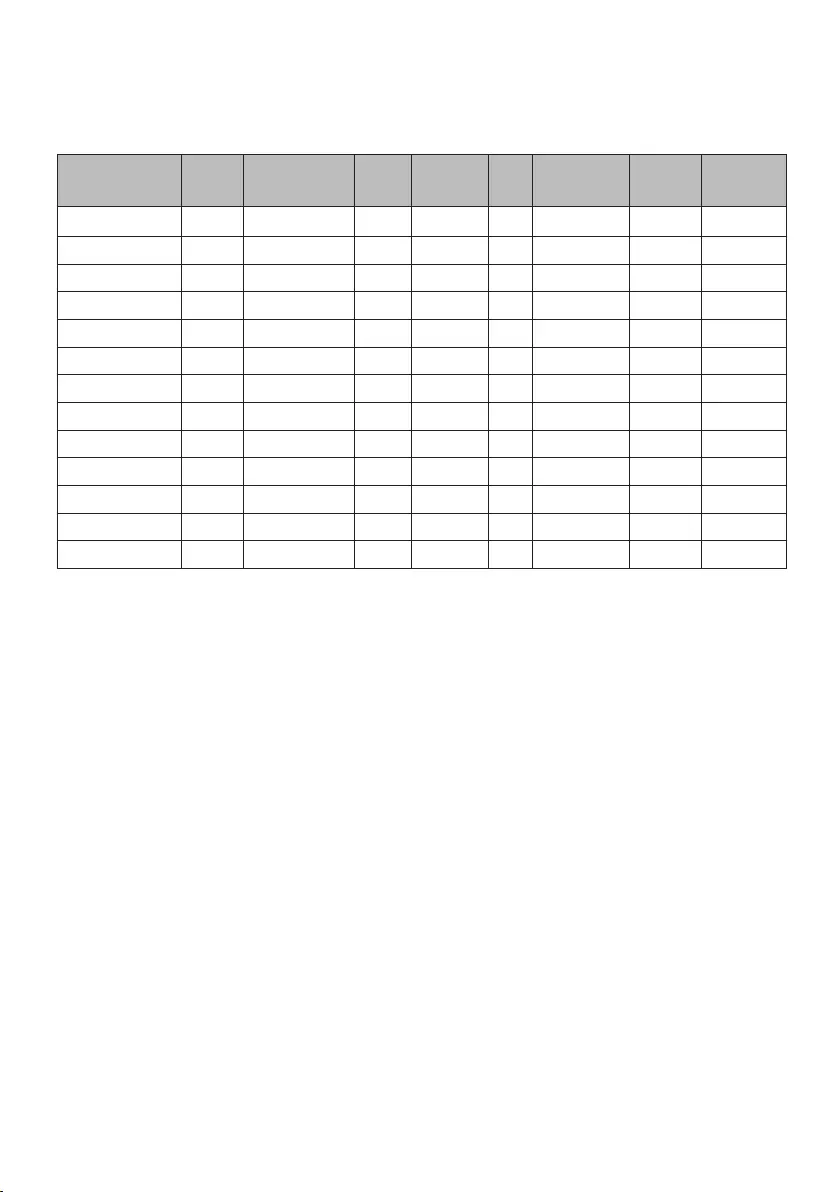
26
EN
Extra Options
Programme Steam Wrinkle Care Turbo
Wash Rinse+ Dry EcoHybrid Add Item Pre Wash
Cotton # # # # # # # #
Cotton+ # # # # # # # #
TurboWash 39 # # #*# # # # #
Mixed Fabric # # # # # # # #
Easy Care # # # # # # # #
Allergy Care #*# # # #
Steam Refresh #*
Delicates # # #
Hand/Wool # #
Speed 14 #*# # # #
Dry Only #*# #
Wash+Dry # # #*# # #
Tub Clean
* This option is automatically inserted in the programme and cannot be deselected.

27
EN
Extra Options and
Functions
* This feature is only available on some models.
You can use the extra options and functions to
customize the programmes.
Steam
Use this function to use the enhanced washing
performance. This option consumes low energy.
1 Press the Power button.
2 Select a washing programme.
3 Press the Steam button.
4 Press the Start/Pause button.
Wrinkle Care \
Use this option to reduce wrinkles by steaming after
spin.
1 Press the Power button.
2 Select a washing programme.
3 Press the Wrinkle Care button for 3 seconds.
4 Press the Start/Pause button.
Turbo Wash
Use this option to wash laundry in less than an
hour, which saves water and energy.
1 Press the Power button.
2 Select a washing programme.
3 Press the Turbo Wash button
4 Press the Start/Pause button.
Rinse
Use this option to select the number of rinse
by pressing the Rinse+ button. This option is
recommended for people with detergent allergies.
Rinse+ G
Use this option to add rinse once.
Dry %
Use the automatic programmes to dry most loads.
Electronic sensors measure the temperature
of the exhaust to increase or decrease drying
temperatures for faster reaction time and tighter
temperature control.
•Cold water tap must be left on during drying
cycles.
•This washing machine’s automatic process from
washing to drying can be selected easily.
•For most drying, make sure all laundry are
similar in material and thickness.
•Do not overload the washing machine by stuffing
too many articles into the drum. Items must be
able to tumble freely.
•If you open the door and remove the load
before the washing machine has finished
its programme, remember to press the
Start/Pause button.
•By pressing the Dry button, you can select:
Normal-Time (30-60-120)-Iron-Low Temp.
-Normal Eco.
•Drying programme can last up to about 7 hours.
•These drying times are given as a guide to
help you set your washing machine for manual
drying.
•After the end of dry, ‘Cd’ is displayed. ‘Cd’ means
crease decreasing. The drying programme is
already done. Press any button and take out
clothes. If you do not press the Start/Pause
button, the programme ends after about 4 hours.

28
EN
Woolen Articles
Do not tumble dry woolen articles. Pull them to their
original shape and dry them flat.
Woven and Loopknit Materials
Some woven and loopknit materials may shrink, by
varying amounts, depending on their quality.
Always stretch these materials out immediately after
drying.
Permanent Press and Synthetics
Do not overload your washing machine.
Take out permanent press articles as soon as the
washing machine stops to reduce wrinkles.
Baby Clothes and Night Gowns
Always check the manufacturer’s instructions.
Rubber and Plastics
Do not dry any items made from or containing
rubber or plastics, such as:
•Aprons, bibs, chair covers
•Curtains and table cloths
•Bathmats
Fiber Glass
Do not dry fiber glass articles in your washing
machine. Glass particles left in the washing
machine may be picked up by your clothes and
cause skin irritation.
NOTE
•When you turn off the drying cycle of the
washing machine, the drying fan motor can be
operated to save itself for 60 seconds.
•Be careful when removing your clothing from the
washing machine, as the clothing or washing
machine may be hot.
•The estimated drying time varies from the actual
drying time during the Automatic cycle. The
type of fabric, size of the load, and the dryness
selected affect drying time.
•When you select drying only, spinning runs
automatically for energy efficiency.
EcoHybrid )
Use this feature for air condensing without water
consumption.
1 Press the Power button.
2 Select a drying programme.
3 Press the EcoHybrid button for 3 seconds.
4 Press the Start/Pause button.
NOTE
•This feature is available with the Normal or Iron
programme.
Delay End
Use this function to automatically start and finish the
appliance after a specified time interval.
1 Press the Power button.
2 Select a washing programme.
3 Press the Delay End button to set a required
time.
4 Press the Start/Pause button.
NOTE
•The delay time is the time to the end of the
programme, not the start. The actual running
time may vary due to water temperature, wash
load and other factors.
•To cancel the function, the Power button should
be pressed.
•Avoid using liquid detergent for this function.

29
EN
Wi-Fi f
When WLAN is connected, the Wi-Fi icon on the
control panel is lit.
Add Item
Use this option to add or remove the laundry after
the washing programme is start.
1 Press the Add Item button when the LED is
turned on.
2 Open the door after it unlocks itself.
3 Add or remove laundry.
4 Close the door and press the Start/Pause
button.
Pre Wash I
Use this option to wash the heavily soiled laundry.
1 Press the Power button.
2 Select a washing programme.
3 Press the Turbo Wash and Dry button for 3
seconds.
4 Press the Start/Pause button.
Child Lock
Use this function to disable the controls. This
function can prevent children from changing cycles
or operating the appliance.
NOTE
•Once this function is set, all buttons are locked
except the Power button.
•When the controls are locked, CL and the
remaining time are alternatively shown on the
display during the wash while the child lock is
engaged.
•Turning off the power will not reset this function.
You must deactivate this function before you can
access any other functions.
Locking the Control Panel
1 Turn on the power.
2 Press and hold the Delay End and Add Item
button for 3 seconds.
•A beeper will sound, and CL will appear on
the display.
Unlocking the Control Panel
1 Turn on the power.
2 Press and hold the Delay End and Add Item
button for 3 seconds to deactivate this function.
Temp.
You can use this option in order to select the
wash and rinse temperature in combination for the
selected programme. Press this button until the
desired setting is lit. Cold tap water is used for all
rinses.
•Select the water temperature suitable for the
type of laundry you are washing. Follow the
fabric care labels for best results.

30
EN
Spin p
Use this option to change the spin strength. Press
the Spin button repeatedly to change the speed
level.
1 Press the Power button.
2 Select a washing programme.
3 Press the Spin button to select spin speed.
4 Press the Start/Pause button.
NOTE
•When you select No, it will still rotate for a short
time to drain quickly.
Beep On/Off
This function operates only when the appliance is
in operation.
•Press and hold the Spin button for 3 seconds
to set the this function.
NOTE
•Once this function is set, the setting is
memorized even after the power is turned off.
•If you want to turn the beeper off, simply repeat
this process.
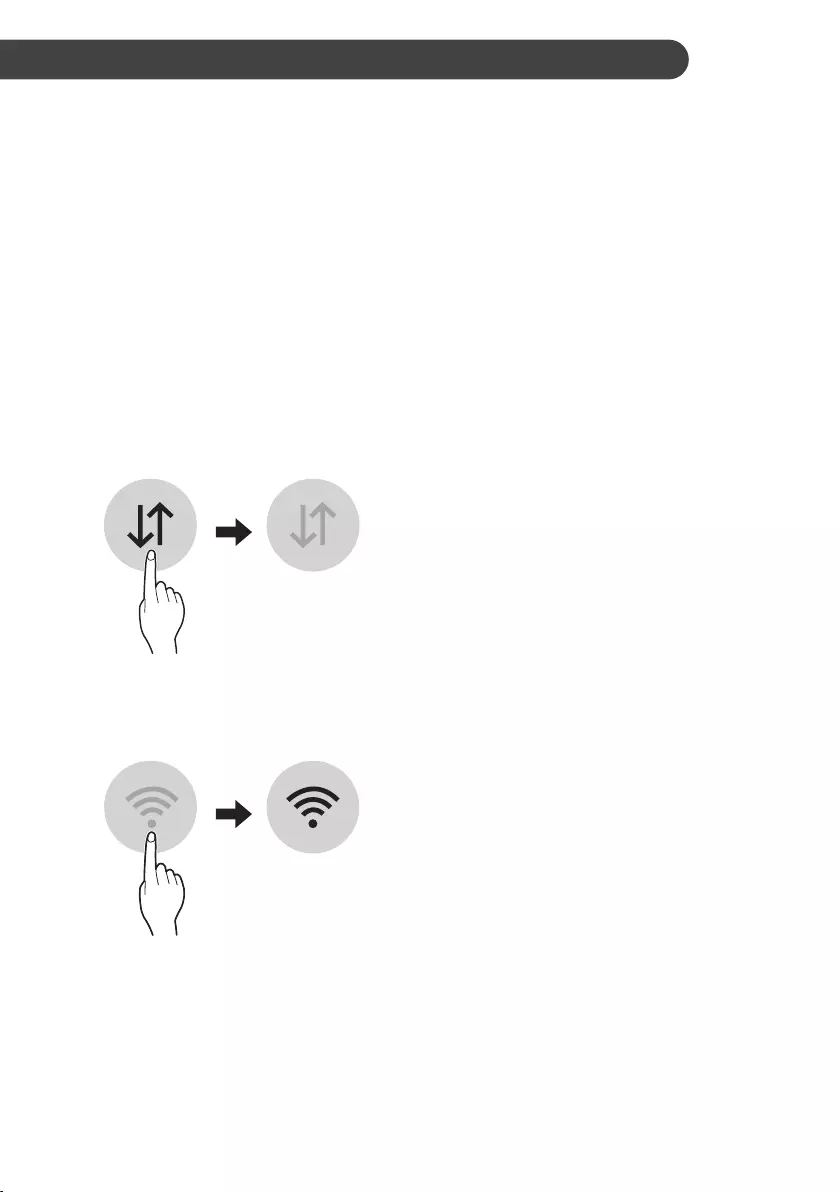
31
EN
SMART FUNCTIONS
Using LG SmartThinQ
Application
This feature is only available on the model with a
or b logo.
Before Using LG SmartThinQ
1 Check the distance between the appliance and
the wireless router (WLAN network).
•If the distance between the appliance and
the wireless router is too far, the signal
strength becomes weak. It may take a long
time to register or installation may fail.
2 Turn off the Mobile data or Cellular Data on
your smartphone.
3 Connect your smartphone to the wireless
router.
NOTE
•To verify the WLAN connection, check that
Wi-Fi f icon on the control panel is lit.
•The appliance supports 2.4 GHz Wi-Fi networks
only. To check your network frequency, contact
your internet service provider or refer to your
wireless router manual.
•LG SmartThinQ is not responsible for any
network connection problems or any faults,
malfunctions, or errors caused by network
connection.
•If the appliance is having trouble connecting
to the Wi-Fi network, it may be too far from
the router. Purchase a Wi-Fi repeater (range
extender) to improve the Wi-Fi signal strength.
•The Wi-Fi connection may not connect or
maybe interrupted because of the home network
environment.
•The network connection may not work properly
depending on the Internet service provider.
•The surrounding wireless environment can make
the wireless network service run slowly.
•The appliance cannot be registered due to
problems with the wireless signal transmission.
Unplug the appliance and wait about a minute
before trying again.
•If the firewall on your wireless router is enabled,
disable the firewall or add an exception to it.
•The wireless network name (SSID) should be a
combination of English letters and numbers. (Do
not use special characters.)
•Smartphone user interface (UI) may vary
depending on the mobile operating system (OS)
and the manufacturer.
•If the security protocol of the router is set to
WEP, you may fail to set up the network. Please
change it to other security protocols (WPA2 is
recommended.) and register the product again.

32
EN
Installing LG SmartThinQ
Search for the LG SmartThinQ application from
the Google Play Store or Apple App Store on a
smartphone. Follow instructions to download and
install the application.
Wi-Fi Function
Communicate with the appliance from a
smartphone using the convenient smart features.
Washer Cycle
(Remote Start, Download Cycle)
Set or download any preferred cycle and operate by
remote control.
Tub Clean Coach
This function shows how many cycles remain
before running the Tub Clean cycle.
Energy Monitoring
Check the energy consumption of the recently used
cycles and monthly average.
Smart Diagnosis
This function provides useful information for
diagnosing and solving issues with the appliance
based on the pattern of use.
Settings
Various functions are available.
Push Alert
This function is to notify the status notification
so that the user can recognize the appliance
status. The notifications are triggered even if the
LG SmartThinQ application is off.
NOTE
•If you change your wireless router, internet
service provider, or password, delete the
registered appliance from the LG SmartThinQ
application and register it again.
•The application is subject to change for
appliance improvement purposes without notice
to users.
•Functions may vary by model.
Using the Appliance Remotely
Remote Start
Use a smartphone to control your appliance
remotely. You can also monitor your cycle operation
so you know how much time is left in the cycle.
Using This Function
1 Press the Power button.
2 Put the laundry into the drum.
3 Press and hold Remote Start button for 3
seconds to enable this function.
4 Start a cycle from the LG SmartThinQ
application on your smartphone.
NOTE
•Once this function is enabled, you can start a
cycle from the LG SmartThinQ smartphone
application. If the cycle is not started, the
appliance will wait to start the cycle until it is
turned off remotely from the application or this
function is disabled.
•When this function is turned on, the door is
automatically locked.
Disabling This Function
When this function is activated, press and hold
Remote Start button for 3 seconds to disable this
function. This function must be turned off, so that
the appliance can be used manually.
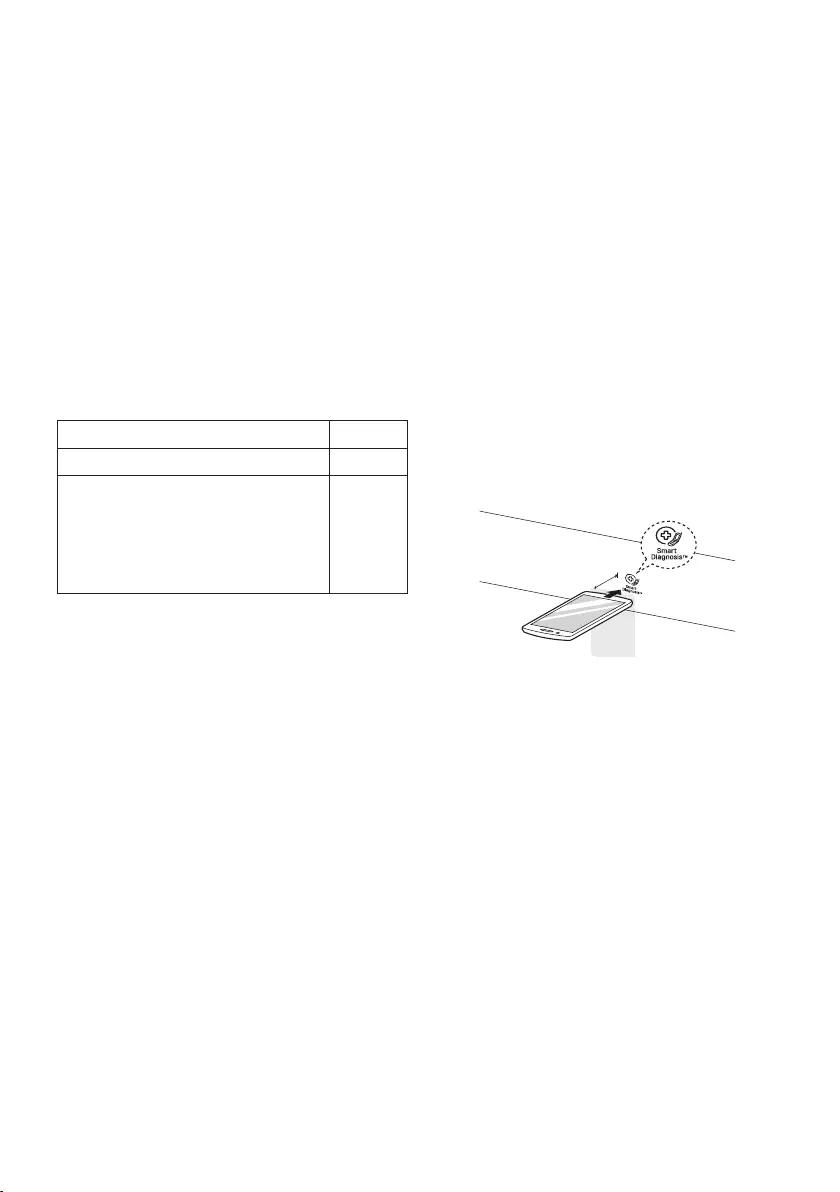
33
EN
Download Cycle
Download a new and special cycle that is not
included in the basic cycles on the appliance.
Appliances that have been successfully registered
can download from a variety of specially cycles
specific to the appliance.
Only one cycle can be stored on the appliance at
a time.
Once cycle download is completed in the appliance,
the product keeps the downloaded cycle until a new
cycle is downloaded.
Standby Power Consumption
Standby power consumption 0.5 W
Network standby power consumption 2.0 W
The period of time after which the
power management function, or
a similar function, switches the
equipment automatically into standby
and/or off mode and/or the condition
providing networked standby
20 min.
Open Source Software Notice
Information
To obtain the source code under GPL, LGPL, MPL,
and other open source licenses, that is contained in
this product, please visit http://opensource.lge.com.
In addition to the source code, all referred license
terms, warranty disclaimers and copyright notices
are available for download.
LG Electronics will also provide open source code
to you on CD-ROM for a charge covering the cost
of performing such distribution (such as the cost of
media, shipping, and handling) upon email request
to opensource@lge.com.
This offer is valid for a period of three years after
our last shipment of this product. This offer is valid
to anyone in receipt of this information.
Using Smart Diagnosis
This feature is only available on the model with c
or d logo.
Smart Diagnosis through the
Customer Information Centre
Use this function if you need an accurate diagnosis
by an LG Electronics customer information centre
when the appliance malfunctions or fails. Use this
function only to contact the service representative,
not during the normal operation.
1 Press the Power button to turn on the
appliance. Do not press any other buttons.
2 When instructed to do so by the call centre,
place the mouthpiece of your phone close to
the Smart Diagnosis icon.
Max.
10 mm
3 Press and hold the Temp. button for 3 seconds.
4 Keep the phone in place until the tone
transmission has finished. Time remaining for
data transfer is displayed.
•For best results, do not move the phone
while the tones are being transmitted.
•If the call centre agent is not able to get an
accurate recording of the data, you may be
asked to try again.
5 Once the countdown is over and the tones
have stopped, resume your conversation with
the call centre agent, who will then be able to
assist you using the information transmitted for
analysis.

34
EN
NOTE
•This function depends on the local call quality.
•The communication performance will improve
and you can receive better service if you use
the home phone.
•If the data transfer is poor due to poor call
quality, you may not receive the best diagnosis
service.

35
EN
MAINTENANCE
WARNING
•Unplug the appliance before cleaning to avoid the risk of electric shock. Failure to follow this warning
may result in serious injury, fire, electric shock, or death.
•Never use harsh chemicals, abrasive cleaners, or solvents to clean the appliance. They may damage
the finish.
Cleaning After Every Wash
Care After Wash
•After the wash cycle is finished, wipe the door
and door seal to remove any moisture.
•Leave the door slightly open to dry the drum.
•Wipe the appliance with a dry cloth to remove
any moisture.
WARNING
•Leave the door open to dry the drum interior but
only if it is safe and any children are supervised.
Cleaning the Exterior
Proper care of your appliance can extend the
service life.
Exterior
Immediately wipe off any spills. Wipe with a damp
cloth.
Door
Wash with a damp cloth on the outside and inside
and then dry with a soft cloth.
WARNING
•Do not attempt to separate any panels or
disassemble the appliance. Do not apply any
sharp objects to the control panel in order to
operate the appliance.
Cleaning the Interior
•Use a towel or soft cloth to wipe around the door
opening and door glass.
•Always remove items from the appliance as
soon as the cycle is complete. Leaving damp
items in the appliance can cause wrinkling,
colour transfer, and odour.
Cleaning the Appliance
Periodically
Tub Clean
Use this function to clean inside of the appliance.
A higher water level is used in this programme at
higher spin speed. Run this function once a month
(or more often if needed) to remove detergent
buildup and other residue.
1 Remove any clothing or items from the
appliance and close the door.
2 Open the dispenser drawer and add
anti-limescale powder to the main wash
compartment.
•Put tablets into the drum.
3 Close the dispenser drawer slowly.
4 Turn on the power, and then select the
Tub Clean.
•tcL will be displayed on the display.
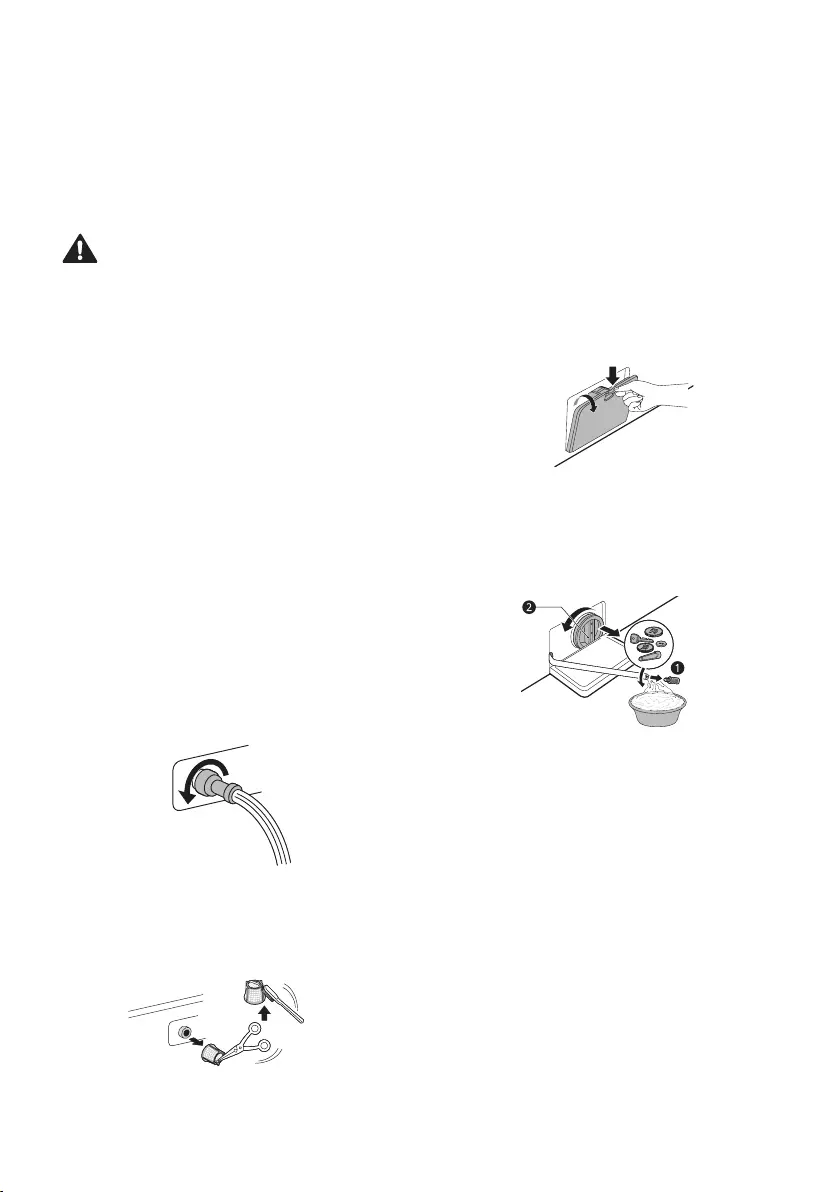
36
EN
5 Press the Start/Pause button to start.
6 After the programme is complete, leave the
door open to dry the door opening, gasket, and
door glass.
CAUTION
•Leave the door open to dry the drum interior but
only if it is safe and any children are supervised.
Cleaning the Water Inlet Filter
Water inlet filter collects lime or any small objects
that may be in water supplied to the appliance.
Clean the water inlet filter regularly.
NOTE
•Turn off the supply tap to the appliance if the
appliance is to be left for a certain period of time
(e.g. holiday), especially if there is no floor drain
(gully) in the immediate vicinity.
•1E message will be displayed on the control
panel when the water is not entering the
detergent drawer.
•If the water is very hard or contains traces of
limescale, the filter on the water inlet may be
clogged.
1 Turn off the water tap and unscrew the water
inlet hose.
2 Clean the filter using a medium bristle tooth
brush.
Cleaning the Drain Pump Filter
The drain filter collects threads and small objects
left in the laundry. Check regularly that the filter is
clean to ensure smooth running of your appliance.
Allow the water to cool before cleaning the drain
pump filter. Open the door in an emergency or
perform a emergency evacuation.
1 Unplug the appliance.
2 Open the cover cap and pull out the hose.
3 Unscrew the drain plug a , and then drain the
water. Slowly unscrew the drain pump filter b
to drain the water and remove small objects.
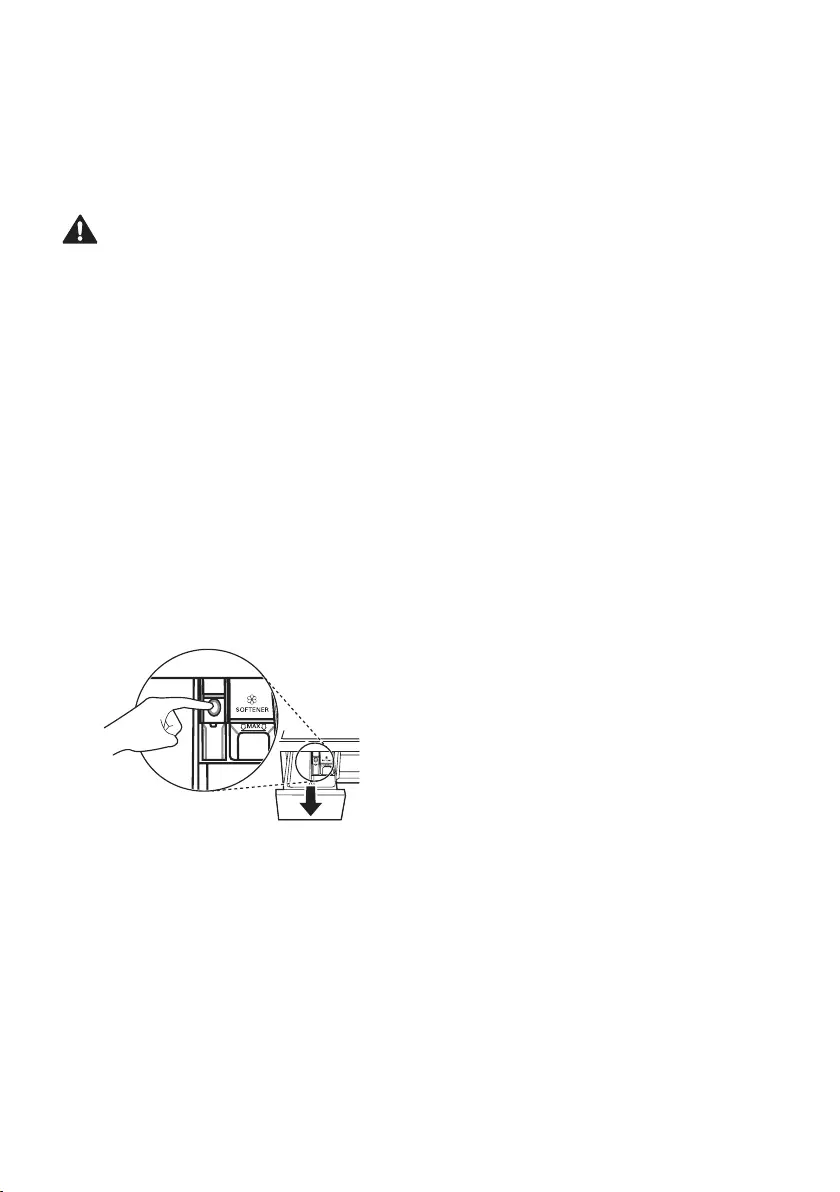
37
EN
4 After cleaning the drain pump filter, take the
drain pump filter out and insert the drain plug.
5 Close the cover cap.
CAUTION
•Be careful when draining, as the water may be
hot.
•Run the drum cleaning programme once a
month (or more often, as needed) to remove
excess detergent and other debris.
Cleaning the Dispenser Drawer
Detergent and fabric softener may build up in the
dispenser drawer. Remove the drawer and the
components of the drawer in the drawer and check
for build-up of detergents or softeners once or twice
a month.
1 Remove the detergent dispenser drawer by
pulling the drawer straight out until the drawer
stops.
•Remove the drawer while pressing the
disengage button.
2 Remove the build-up of detergent and softener.
•Rinse the drawer and the components of the
drawer with warm water to remove the build-
up from detergent and softener. Use only
water to clean the dispenser drawer. Dry the
drawer and the components of the drawer
with a soft cloth or towel.
3 To clean the drawer opening, use a cloth or
small, non-metal brush to clean the recess.
•Remove all residue from the upper and lower
parts of the recess.
4 Wipe any moisture off the recess with a soft
cloth or towel.
5 Re-assemble the components of the drawer to
the proper compartments and insert the drawer.
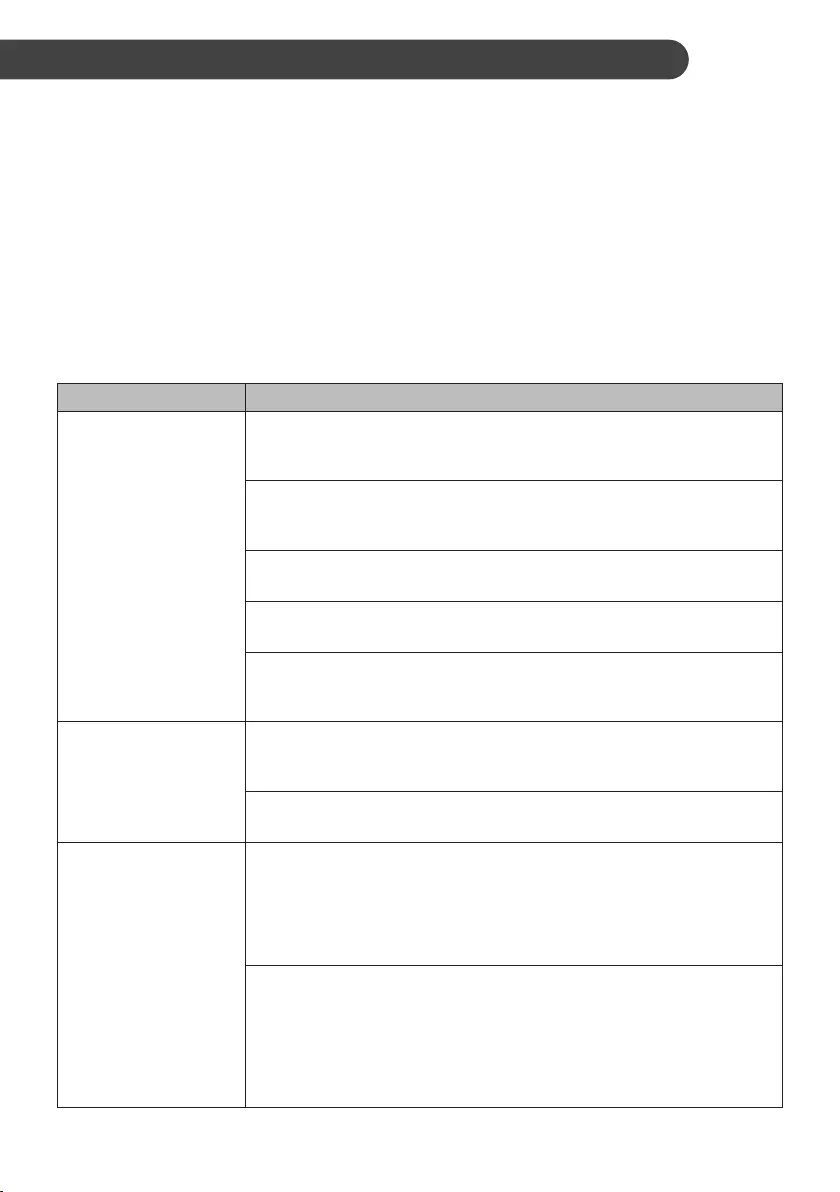
38
EN
TROUBLESHOOTING
Operation of the appliance can lead to errors and malfunctions. The following tables contain possible
causes and notes for resolving an error message or malfunction.
Before Calling for Service
You can remedy most of the problems by yourself, consequently save time and money, since you do not
need to call LG Electronics service centre. The following table should assist you by troubleshooting.
Error Messages
The appliance is equipped with an automatic error-monitoring system to detect and diagnose problems at
an early stage. If this appliance does not function properly or does not function at all, check the following
before you call LG Electronics service centre.
Symptoms Possible Cause & Solution
1E
INLET ERROR
Water supply is not adequate in that location. Water does not enter
appliance or it enters slowly.
•Check another tap in the house.
Water supply tap is not completely open. Water does not enter the
appliance or it enters slowly.
•Open fully tap.
Water supply hose(s) are kinked.
•Straighten hose or reinstall the water inlet hose
The filter of the supply hose(s) are clogged.
•Check and clean the filter of the inlet hose.
If water leakage occurs in the aqua stop supply hose, indicator will
become red.
•Replace the aqua stop supply hose.
OE
WATER OUTLET
ERROR
Drain hose is kinked or clogged. Water in the appliance does not drain
or drains slowly.
•Clean and straighten the drain hose.
The drain filter is clogged.
•Check and clean the drain filter.
UE
UNBALANCE ERROR
The appliance has a system which detects and corrects the unbalance
of the appliance.
•The laundry may be too wet at the end of the cycle, rearrange the laundry
to allow proper spinning. Close the door and press Start/Pause button.
It may take a few moments before the appliance begins to spin. The door
must be locked before spin can be achieved.
Load is too small. This system may stop spinning or even interrupt the
spin cycle altogether if individual heavy articles (e.g. bath mat, bath
robe, etc.) are loaded.
•Add 1 or 2 similar items or smaller articles of laundry to help balance the
load. Close the door and press Start/Pause button. It may take a few
moments before the appliance begins to spin. The door must be locked
before spin can be achieved.
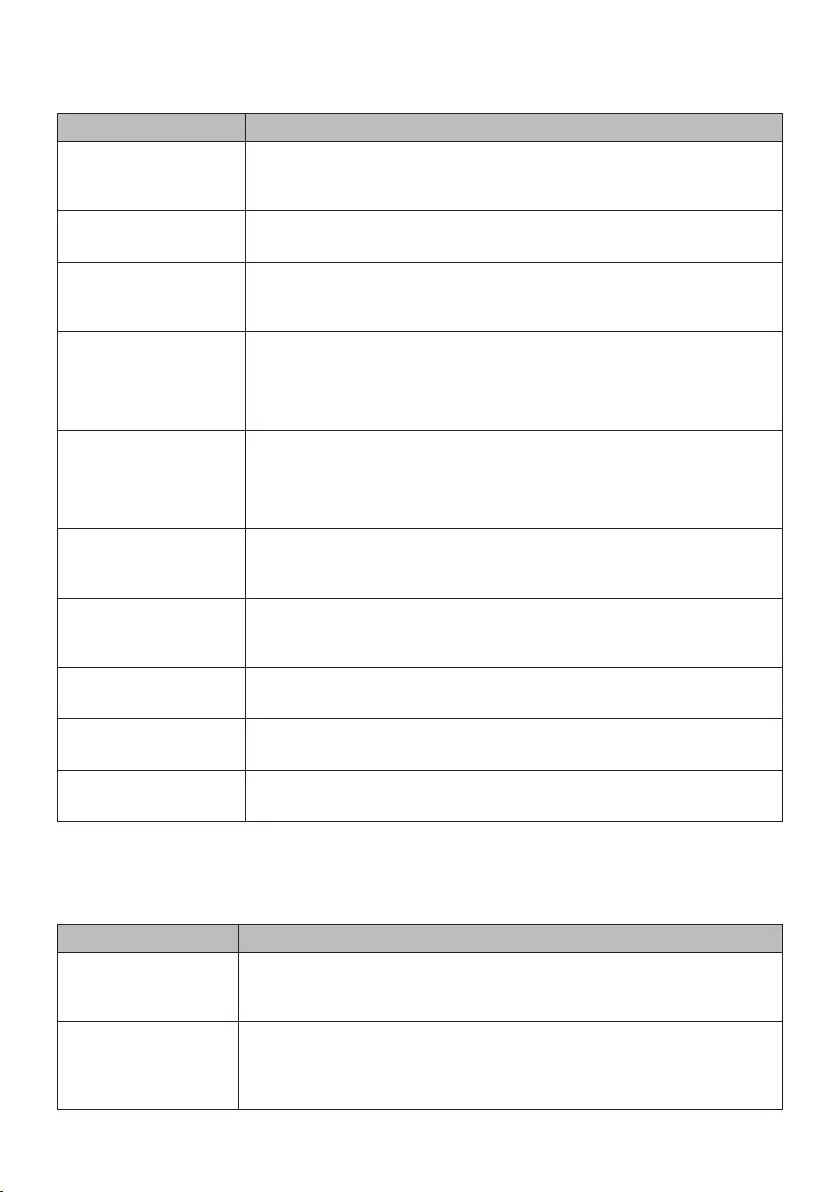
39
EN
Symptoms Possible Cause & Solution
dE dE1 dEz dE4
DOOR ERROR
Door sensor malfunctions.
•Please call LG Electronics service centre. You can find your local LG
Electronics service centre phone number in the warranty card.
tE
CONTROL ERROR
This is a control error.
•Unplug the power plug and call for service.
LE
MOTOR LOCKED
ERROR
Over load in motor
•Let the appliance wait for 30 minutes until the motor is cooled down and
then, restart the cycle.
FE
OVERFLOW ERROR
Water overfills due to the faulty water valve.
•Close the water tap.
•Unplug the power plug.
•Call for service.
PE
PRESSURE SENSOR
ERROR
Water level sensor malfunctions.
•Close the water tap.
•Unplug the power plug.
•Call for service.
vs
VIBRATION SENSOR
ERROR
Vibration sensor malfunctions.
•Call for service.
FF
FROZEN FAILURE
Is supply/drain hose or drain pump frozen?
•Supply warm water into the drum in order to unfreeze the drain hose and
the drain pump. Cover the supply hose with wet and warm towel.
AE
WATER LEAKAGE
Water leaks.
•Call for service.
PF
POWER FAILURE
The appliance experienced a power failure.
•Restart the cycle.
dHE
DRY ERROR
Does not dry.
•Call for service.
Noises You Might Hear
Symptoms Possible Cause & Solution
Rattling and clanking
noise
Foreign objects, such as keys, coins, or safety pins may be in the drum.
•Stop the appliance, check the drum for foreign objects. If the noise
continues after the appliance is restarted, call for service.
Thumping sound Heavy wash loads may produce a thumping sound. This is usually
normal.
•If the sound continues, the appliance is probably out of balance. Stop and
redistribute the wash load.

40
EN
Symptoms Possible Cause & Solution
Thumping sound Wash load may be out of balance.
•Pause the cycle and redistribute the load after the door unlocks.
Vibrating noise Package materials are not removed.
•Remove package materials.
Wash load may be unevenly distributed in the drum.
•Pause the cycle and redistribute the load after the door unlocks.
Not all levelling feet are resting firmly and evenly on the floor.
•See the Levelling the Appliance to adjust the levelling of the appliance.
Floor not rigid enough.
•Check if the floor is sold and does not flex. See the Installation Place
Requirements to select the proper location.
Operation
Symptoms Possible Cause & Solution
Water is leaking. House drain pipes are clogged.
•Unclog the drain pipe. Contact plumber if necessary.
Leakage is caused by improper installation of drain hose or clogged
drain hose.
•Clean and straighten the drain hose. Check and clean the drain filter
regularly.
Appliance does not
operate.
Control panel has powered off due to inactivity.
•This is normal. Press the Power button to turn the appliance on.
Appliance is unplugged.
•Make sure that the cord should be plugged securely into a working outlet.
Water supply is turned off.
•Turn the water supply tap completely.
Controls are not set properly.
•Make sure that the cycle should be correctly set. Close the door and press
the Start/Pause button.
Door is open.
•Close the door and make sure that nothing should be caught under the
door preventing it from closing completely.
Circuit breaker/fuse is tripped/blown.
•Check house circuit breakers/fuses. Replace fuses or reset breaker. The
appliance should be on a dedicated branch circuit. The appliance will
resume the cycle where it stopped once power is restored.
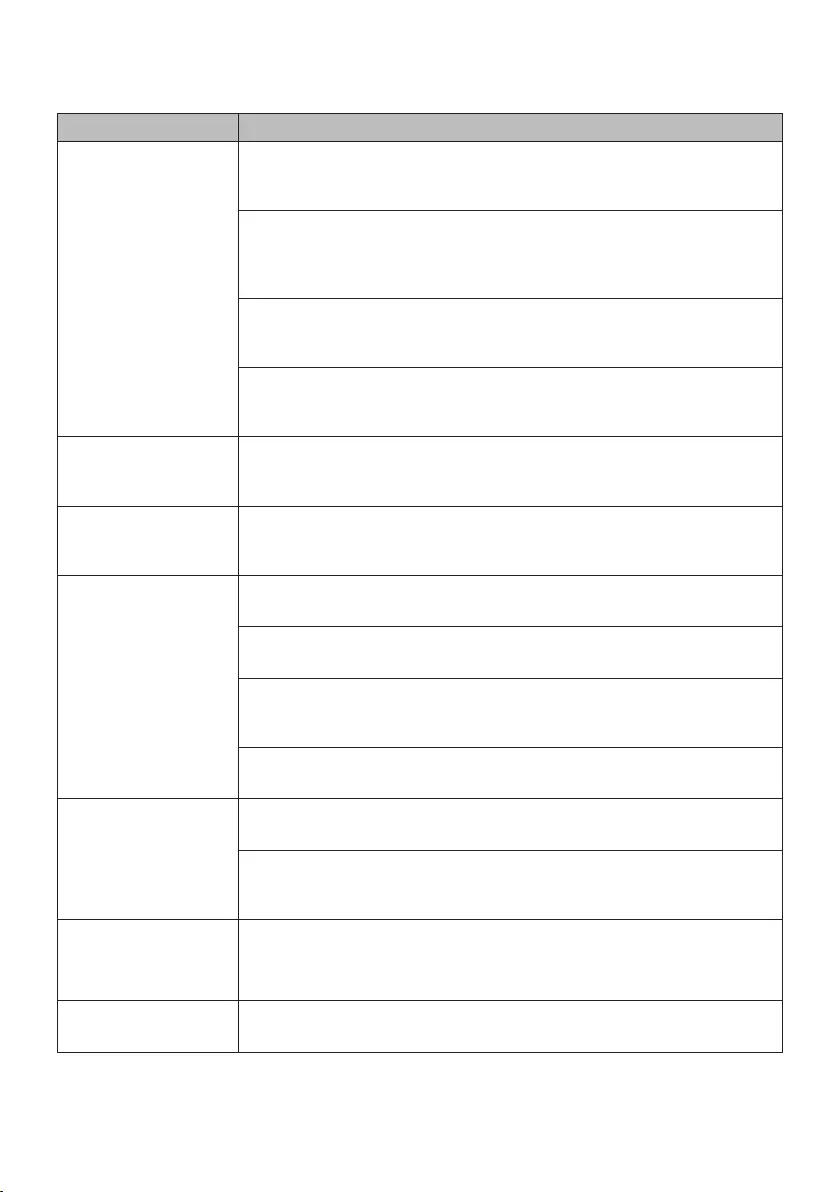
41
EN
Symptoms Possible Cause & Solution
Appliance does not
operate.
Control needs to be reset.
•Press the Power button, then reselect the desired programme and press
the Start/Pause button.
Start/Pause was not pressed after a cycle was set.
•Press the Power button, then reselect the desired programme and press
the Start/Pause button. The appliance is turned off if the Start/Pause
button is not pressed within 15 minutes.
Extremely low water pressure.
•Check another tap in the house to make sure that household water
pressure should be adequate.
Appliance is heating the water or making steam.
•The drum may stop operating temporarily during certain cycles, while
water is safely heated to a set temperature.
Buttons may not
function properly.
The door cannot be opened for safety reasons once the appliance starts.
•Check if the CL is illuminated. You can safely open the door after the
Door Lock icon turns off.
Door does not open. The door cannot be opened for safety reasons once the appliance starts.
•Check if the H icon is illuminated. You can safely open the door after the
H icon turns off.
Appliance is not filling
properly.
Filter clogged.
•Make sure the inlet filters on the fill valves are not clogged.
Inlet hoses may be kinked.
•Check that inlet hoses are not kinked or clogged.
Insufficient water supply.
•Make sure that both hot and cold water taps should be turned on all the
way.
Hot and cold inlet hoses are reversed.
•Check inlet hose connections.
Appliance does not
drain water.
Kinked drain hose.
•Ensure that the drain hose is not kinked.
Drain located higher than 1.2 m above the floor.
•Make sure that the drain hose should not be higher than 1.2 m above the
bottom of the appliance.
Detergent is
not dispensed
incompletely or not
dispensed at all.
Too much detergent is used.
•Follow the guidelines provided by the detergent manufacturer.
Cycle time is longer
than usual.
The load is too small.
•Add more items to allow the appliance to balance the loads.

42
EN
Symptoms Possible Cause & Solution
Cycle time is longer
than usual.
Heavy articles are mixed with lighter items.
•Always try to wash articles with similar weight in order to allow the
appliance to evenly distribute the weight of the load for spinning.
The load is out of balance.
•Manually redistribute the load if articles have become tangled.
Duration is delayed Unbalance is detected or suds removing programme is on.
•This is normal. The time remaining shown on the display is only an
estimated duration. Actual time may vary.
Drying
Symptoms Possible Cause & Solution
Dry problem Check water supply tap.
•Do not overload. Check that the washing machine is draining properly to
extract adequate water from the load. When load of laundry is too small to
tumble properly. Add a few towels.
•Turn off water supply tap.
Drying performance is
too low or bad.
Water is not properly supplied. The water is used for auto-cleaning of
lint-filter on drum during the drying.
•Make sure the water supply tap is open.
Water does not properly drain.
•Make sure the drain filter is not clogged.
The appliance is overloaded.
•Check the load capacity for the selected cycle. If necessary, add a time
dry cycle.
The spin speed is too low.
•Select the highest spin speed allowed for the wash cycle.
Drying time is too
long.
The ambient temperature is low.
•Make sure the temperature is allowable range.
A warm air comes out
from the rear side of
the appliance.
This appliance makes a warm air to dry the laundry.
•This warm air dries the laundry and comes out from the rear side of the
appliance.
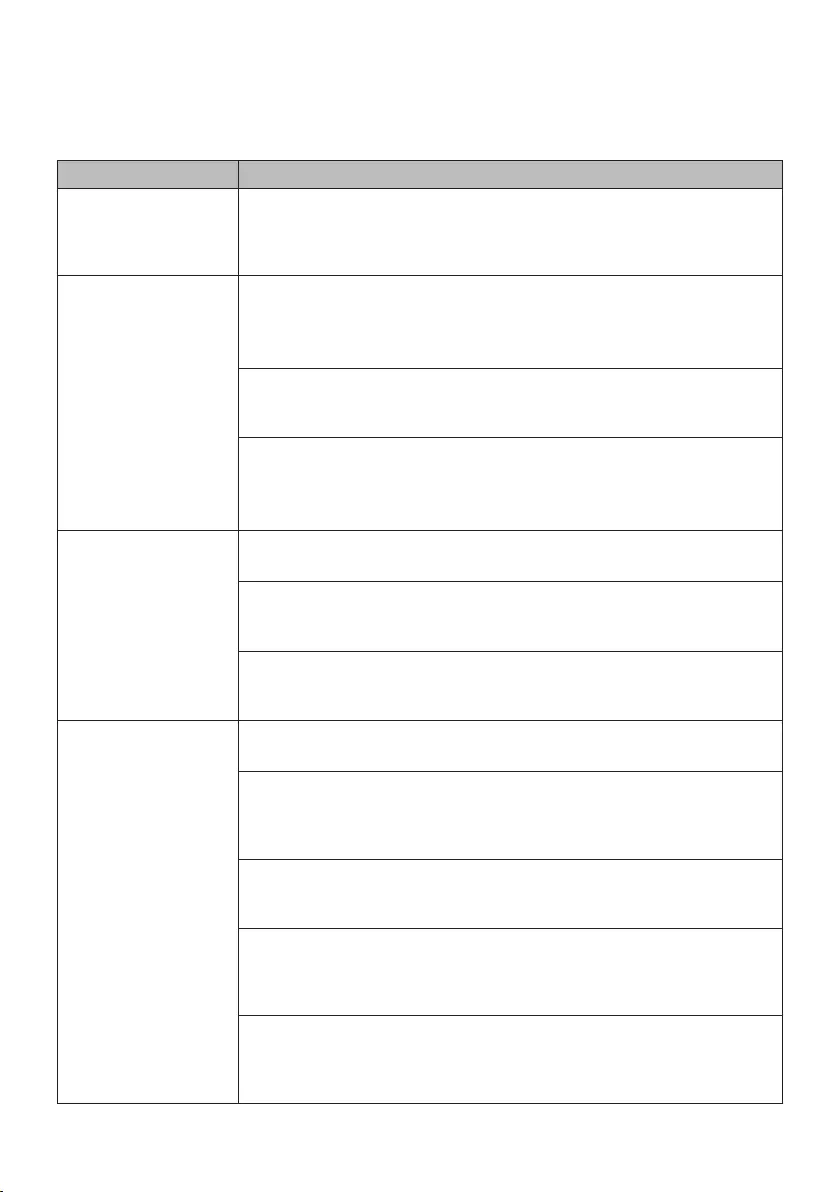
43
EN
Performance
Symptoms Possible Cause & Solution
Poor stain removal Previously set stains.
•Articles that have been previously washed may have stains which have
been set. These stains may be difficult to remove and may require hand
washing or pre-treating to aid in stain removal.
Staining Bleach or softener is dispensed too soon.
•Dispenser compartment is overfilled. It makes bleach or softer dispensed
rapidly. Always measure bleach or softener to prevent overfilling.
•Close the dispenser drawer slowly.
Bleach or softener was added directly to the wash load in the drum.
•Always use the dispensers to ensure that laundry products are properly
dispensed at the right time in the cycle.
Clothes were not properly sorted.
•Always wash dark colours separately from light colours and whites to
prevent discolouration.
•Never wash heavily soiled items with lightly soiled items.
Wrinkling Appliance is not unloaded promptly.
•Always remove items from the appliance as soon as the cycle is complete.
Appliance is overloaded.
•The appliance can be fully loaded, but the drum should not be tightly
packed with items. The door of the appliance should be closed easily.
Hot and cold water inlet hoses are reversed.
•Hot water rinse can set wrinkles in garments. Check the inlet hose
connections.
Musty or mildewy
odour in appliance
Inside of drum is not cleaned properly.
•Run the Tub Clean function regularly.
The drain hose is not properly installed, causing siphoning (water
flowing back inside of the appliance).
•When installing the drain hose, make sure that it does not get kinked or
blocked.
The detergent dispenser drawer is not cleaned regularly.
•Clean the detergent dispenser drawer, especially the top and the bottom of
the drawer’s opening.
Odours can occur if the drain hose is not properly installed, causing
siphoning (water flowing back inside of the appliance).
•When installing the drain hose, make sure that it does not get kinked or
blocked.
If the detergent dispenser drawer is not cleaned regularly, odours can
occur from mold or foreign substances.
•Clean the detergent dispenser drawer, especially the top and bottom of the
drawer’s opening.

44
EN
Wi-Fi
Symptoms Possible Cause & Solution
Your home appliance
and smart phone is
not connected to the
Wi-Fi network.
The password for the Wi-Fi that you are trying to connect to is incorrect.
•Find the Wi-Fi network connected to your smartphone and remove it, then
register your appliance on LG SmartThinQ.
Mobile data for your smartphone is turned on.
•Turn off the Mobile data of your smartphone and register the appliance
using the Wi-Fi network.
The wireless network name (SSID) is set incorrectly.
•The wireless network name (SSID) should be a combination of English
letters and numbers. (Do not use special characters).
The router frequency is not 2.4 GHz.
•Only a 2.4 GHz router frequency is supported. Set the wireless router to
2.4 GHz and connect the appliance to the wireless router. To check the
router frequency, check with your internet service provider or the router
manufacturer.
The distance between the appliance and the router is too far.
•If the distance between the appliance and the router is too far, the signal
may be weak and the connection may not be configured correctly. Move
the location of the router so that it is closer to the appliance.
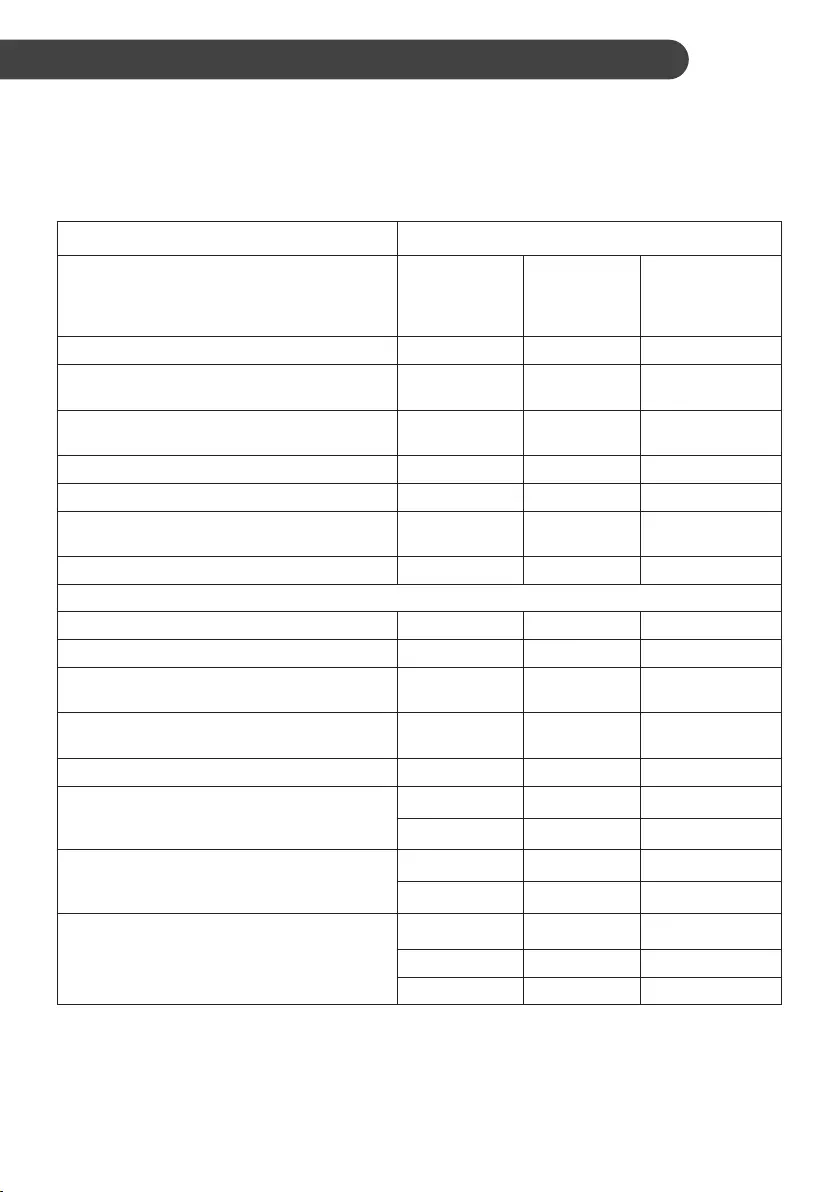
45
EN
OPERATING DATA
Product Fiche
Commission Directiv (EU) No 96/60/EC
Supplier’s name or trade mark LG
Supplier’s model
FWV917WTS
V9WD107H2S
F4DV910H2
V9WD96H2
V9WD960
F4DV909H2
FWV996WTS
Energy efficiency class*1 A A
Energy consumption for washing, spinning and
drying*2 kWh/cycle 7.14 6.12
Energy consumption for washing and spinning
only*3 kWh/cycle 1.37 1.52
Washing performance class*4 A A
Water extraction efficiency*5 A A
Water remaining after spin (as a proportion of
dry weight of wash) % 44 44
Maximum spin speed*6 rpm 1370 1370
Rated capacity
Washing capacity kg 10.5 9
Drying capacity*8 kg 7 6
Water consumption for washing, spinning and
drying*9 litres/cycle 180 165
Water consumption for washing and spinning
only*10 litres/cycle 70 62
Washing and drying time*11 min. 789 660
Estimated annual energy and water
consumption for a four-person household,
always using the drier (200 cycles)*12
kWh/year 1428 1224
litres/year 36000 33000
Estimated annual energy and water
consumption for a four-person household, never
using the drier (200 cycles)*12
kWh/year 274 304
litres/year 14000 12400
Noise during washing, spinning and drying
phases using standard 60° C cotton washing
cycle and ‘dry cotton’ drying cycle.
dB(A) 48 48
dB(A) 71 71
dB(A) 54 54
*1: Energy efficiency class scale is from A (more efficient) to G (less efficient).
*2: For washing, spinning, and drying, in kWh per complete operating cycle.
*3: For washing and spinning only, in kWh per washing cycle.

46
EN
*4: Washing performance class scale is from A (higher) to G (lower).
*5: Water remaining after spin after standard 60 °C cotton washing cycle (as proportion of dry weight of the
wash)
*6: Attained for the standard 60 °C cotton washing cycle
*7: Of appliance for a standard 60 °C cotton washing cycle.
*8: Of appliance for a standard ‘dry cotton’ drying cycle.
*9: In liters, using standard 60° C cotton washing cycle and ‘dry cotton’ drying cycle
*10: In litres, using standard 60° C cotton washing (and spinning) cycle
*11: Programme time for complete operating cycle (60 °C cotton washing and ‘dry cotton’ drying)
*12: The consumption of energy and water equal to 200 cycles consumption
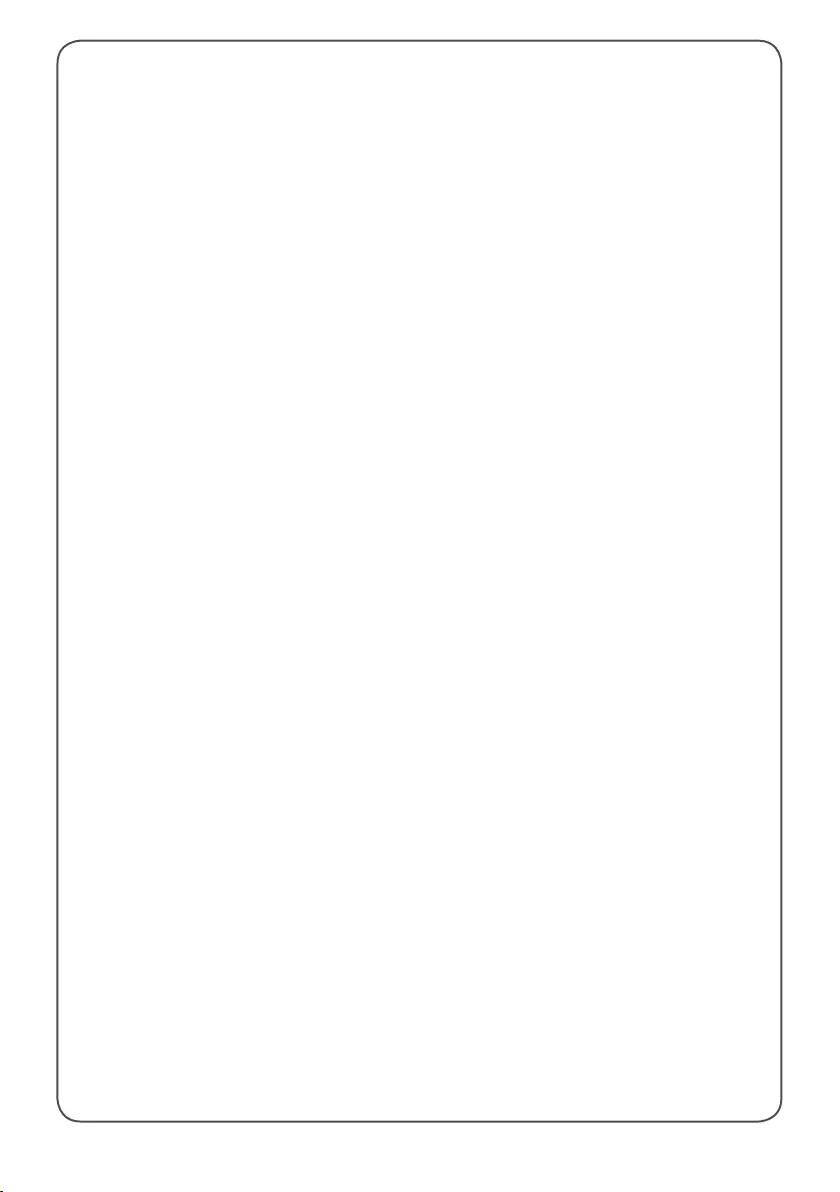
Memo

,UX;1)[YZUSKX
);9:53+89+8</)+9:KR ;1
/+
2-+;19+8</)+=+(9/:+ ]]]RMIUS[Q